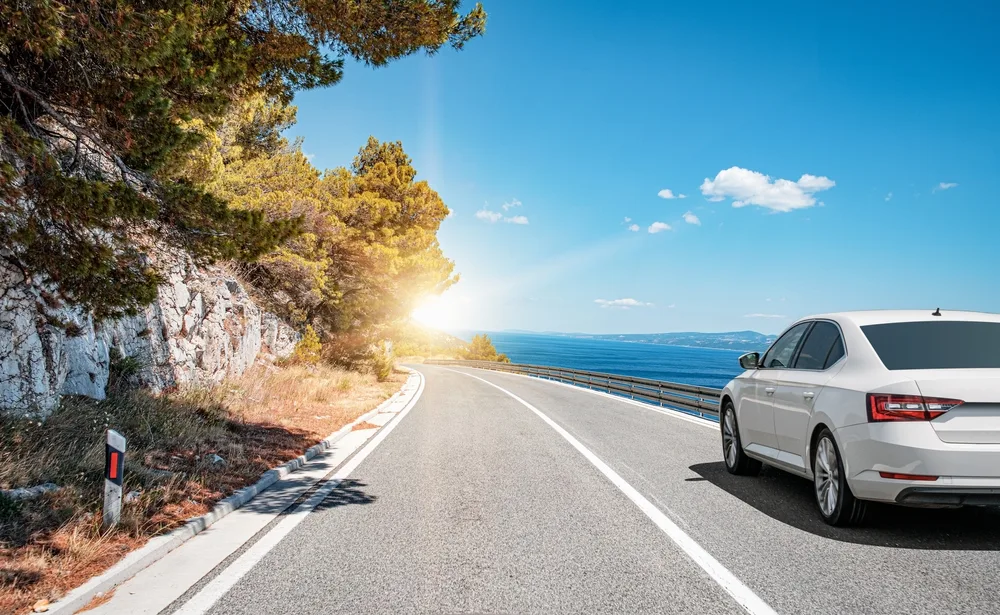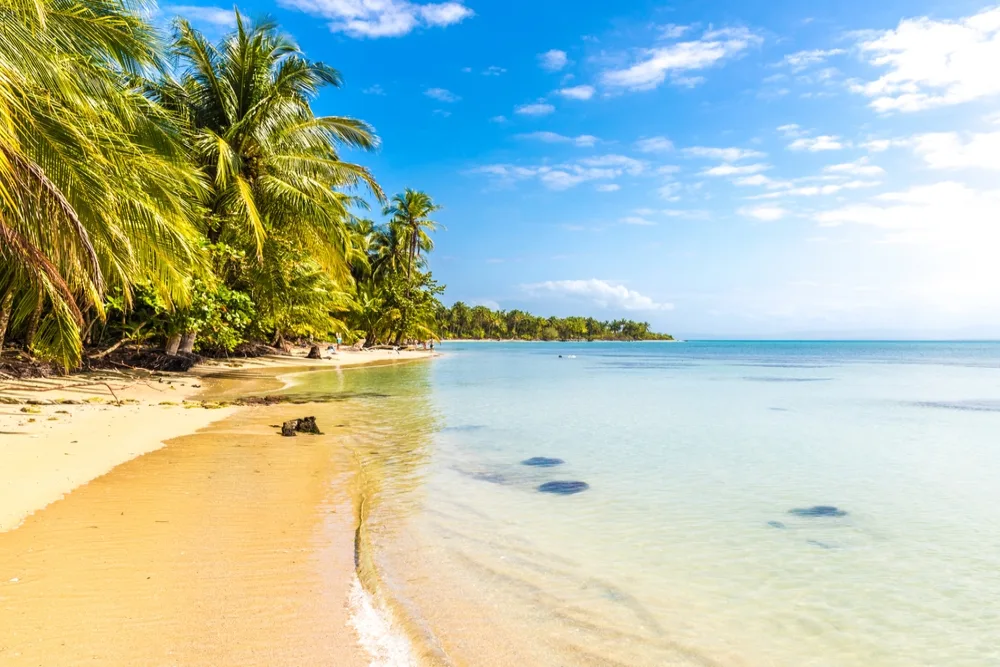13 Road rules you’d never expect around the world

Thinking of hiring a car on holiday? It’s a brilliant way to explore off the beaten track – but what counts as “normal” at home might raise eyebrows (or fines) abroad. Some countries have road rules that are downright bizarre, while others are just strict in ways you wouldn’t expect.
Whether you're heading for the coast, the mountains, or the middle of nowhere, here’s what you need to know before hitting the road.
1. France: Carry a breathalyser
Since 2013, drivers in France have been legally required to carry a self-test breathalyser in their car. The idea is simple – if you’re unsure whether you're over the legal limit, you should test yourself before driving.
While the fine for not having one was scrapped in 2020, the rule itself remains on the books. Pick up a twin-pack from a local pharmacy or service station. They’re cheap, easy to store, and still expected if you’re pulled over.
You’re also required to have a hi-vis jacket for each passenger, a warning triangle, and headlight beam deflectors for UK/Irish cars.
2. Germany: No stopping on the Autobahn
The German autobahn is famous for having no general speed limit – but that doesn’t mean anything goes. Stopping on the autobahn is strictly illegal unless it’s a true emergency. And running out of petrol? That’s not considered one.
Germany expects drivers to take full responsibility for their vehicle’s roadworthiness, including keeping it fuelled. Always plan your refuelling stops and avoid venturing onto the autobahn if you’re running low.
If you’re overtaking, do it fast and from the left – and move back over as soon as you can.
3. Cyprus: No eating or drinking
In Cyprus, the rules around distracted driving go further than you’d expect. Eating or drinking – even something as harmless as a bottle of water – is prohibited behind the wheel. It’s seen as a distraction, just like texting or taking a call.
If you’re caught red-handed, you can expect to receive a fine of around €85. So, if you’re on a long drive, pull over before reaching for a drink or a sweet.
4. USA: 50 States, 50 sets of rules
Driving across state lines in the US? Don’t assume the rules stay the same. What’s legal in Florida might not fly in California. For example, most states allow turning right at red lights after stopping, but New York City bans it unless a sign says otherwise.
Always read signage carefully. And remember, road markings and terminology (like “yield” instead of “give way”) can differ.
Fun fact: In Alabama, it’s technically illegal to drive blindfolded. It’s a law likely created for the history books, but still enforceable.
5. Spain: Bring a spare pair of specs
Spain has a law that catches many drivers off guard: if you wear prescription glasses, you’re expected to carry a second pair in the car. The rule isn’t always enforced, but in the event of an accident or police check, not having them could be a problem.
It’s about making sure you can keep driving safely if your primary pair breaks.
Some regions also discourage driving in flip-flops or sandals with poor grip. It’s not illegal everywhere, but it's potentially considered unsafe.
6. South Africa: Watch out for four-way stops
Four-way stops are common across South Africa, but the rules are different from what many are used to. The vehicle that arrives first has the right of way, regardless of which direction they're coming from.
Everyone’s expected to take turns and be patient. Honking or rushing is rare – locals tend to handle it politely.
In wildlife areas, animals have the right of way. If you encounter elephants or giraffes on the road, switch off your engine and wait quietly.
7. Japan: Splashing pedestrians is illegal
Respect is a cornerstone of Japanese culture, and that extends to the roads. If you drive through a puddle and splash a pedestrian, you could be fined for dangerous driving or public nuisance. So, make sure you slow down near kerbs in wet weather, especially in city areas.
Horn use is also rare – it’s typically reserved for emergencies. Casual honking is considered impolite.
8. Australia: The weird hook turn
Melbourne has one of the oddest driving quirks in the world – the hook turn. At certain busy intersections, you can only turn right from the far left lane. The move helps trams flow freely through the city, but it’s easy to miss the signage.
Move to the far left, indicate right, and wait in the intersection until the light for the cross street turns green. Then make your turn. Watch for signs that say “Hook Turn Only” – and if in doubt, don’t force it.
9. India: The horn isn’t rude – it’s required
In India, your horn is a vital communication tool. Drivers use it constantly – to signal they're overtaking, to warn others of their presence, or just to move things along.
You’ll often see “Horn OK Please” painted on the back, a literal invitation to honk when overtaking. Yes, it’s noisy – but it works.
10. Italy: ZTL zones could cost you
Many Italian cities have ZTLs – Zona a Traffico Limitato, or restricted traffic zones. These areas are off-limits to most cars without a local permit. They’re marked by signs, not barriers, so tourists often drive straight in without realising.
Cameras are everywhere, and fines are enforced (sometimes months after you’re home). Check your hotel’s advice and use apps like Waze that warn about ZTLs.
11. Thailand: Shirtless driving ban
It’s hot, we get it. But in Thailand, driving shirtless is technically a violation of public conduct laws. You may be fined if you’re stopped, particularly in tourist-heavy areas.
Proper footwear also matters. Flip-flops might not be considered safe and could cause issues with insurance claims.
12. Norway: Headlights should always be on
Daytime running lights aren’t just a safety suggestion in Norway – they’re a legal requirement. Even on the sunniest day, your dipped headlights should be on as standard. This is to increase visibility during long twilight hours and sudden weather shifts.
It applies in Sweden and Finland too. If your car doesn’t switch them on automatically, you’ll need to do it manually.
13. Mexico: Polite persistence beats bribes
While unofficial roadside bribes (or “mordida”) are technically illegal in Mexico, they still happen in some regions. Tourists may be asked to pay fines on the spot, but that doesn’t mean you should.
Request a written ticket and ask to pay at a police station. Being firm but respectful usually gets the best result.
Ready to hit the road?
Driving abroad isn’t just about getting from A to B – it’s part of the adventure. It’s the freedom to chase sunsets, pull over at vineyard signs, or stumble across tiny villages you’d never see by bus. But when the rules of the road change every few hundred kilometres, being clued in makes all the difference.
A bit of local knowledge (and the right travel insurance) can help you feel confident behind the wheel. So wherever your road trip takes you – mountain passes, coastal highways, or city-centre cobbles – go prepared and enjoy the ride.
Get a quick travel insurance quote
Affordable travel insurance for all your needs
Discover the World
Stay up to date with the latest travel tips and advice

Top 10 skiing destinations in 2026

Where to find the sun in January
